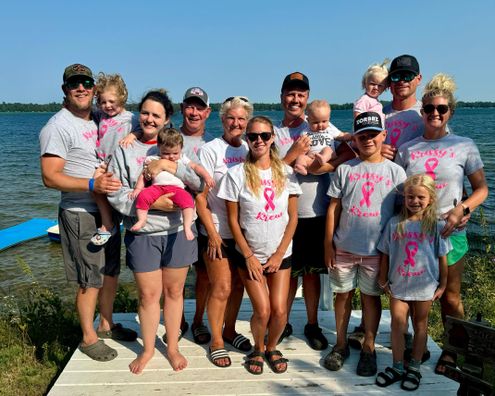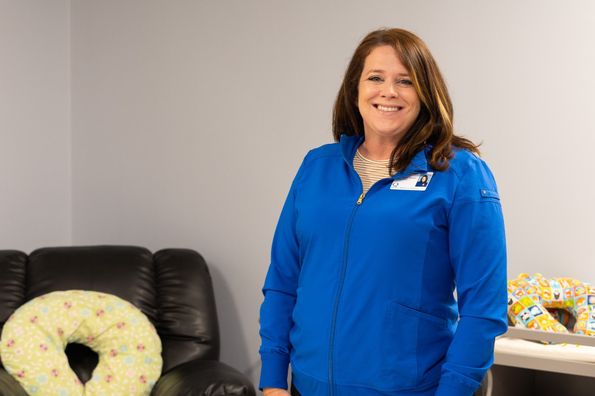Motherhood comes with a lot of joy, but it can also bring unique challenges and struggles. As moms, it’s natural to prioritize the needs of our children, and it’s equally important to take care of ourselves. According to Postpartum Support International, one out of five women are affected by maternal mental health disorders including postpartum depression, anxiety, OCD, bipolar, PTSD, and psychosis.
In fact, maternal mental health disorders are the number one complication of childbirth and one of the leading causes of maternal death, yet fewer than 15% of new moms receive treatment, according to The Blue Dot Project.
It’s essential to acknowledge these startling statistics and to support moms to make sure that their mental health needs are being met.
Breaking the myths of motherhood: According to the book, Not Your Mother’s Postpartum Book, some myths include:
- Bonding is natural and will happen instantly. An expectation that mothers have is that they will instantly fall in love with their baby as soon as their baby is out of the womb and they hold the baby. This does not happen for everyone. Some moms may not feel an instant bond/connection and this bond develops over time.
- Breastfeeding is best. Some moms are unable to breastfeed for multiple reasons. What is best is that the baby is healthy and fed.
- A good mom can push through anything. The expectation that moms can do anything without help from anyone is not realistic. It is important for moms to know that it is okay to ask for help.
- You need to love every second of motherhood. The reality is — no one is going to love every second of motherhood. There are going to be many things that a mother will not love and this is okay.
- Holding your newborn will spoil them. It is impossible to spoil a newborn. What a newborn needs the most is to be held, comforted, soothed, fed, and changed. These things help a newborn develop a secure attachment. All infants struggle with adjusting to life outside of the womb (some may adjust better than others) and some infants need more comfort and soothing than others
- Offer a listening ear and helping mothers feel heard. It is also important to help them know that they are not alone — that there are others who know and experience the same emotions or thoughts they are having.
- Ask new mothers about their emotions, mental health, and how they are feeling. It is important to ask new mothers if there are any feelings or thoughts they are experiencing that concerns them. Encourage them to speak with their doctor. Ask about how they are adjusting to life with their new baby and about their support system. Provide information on community and/or online resources. Provide coping strategies.
- Postpartum Support International offers many types of online support groups. More information can be found here: https://www.postpartum.net/get-help/psi-online-support-meetings
- Coping Strategies include: eating a snack, drinking water, breathing exercises, listening to music, getting outdoors (e.g., going for walk with baby, sitting outside), talking to a supportive person, watching funny videos, listen to an audio book or podcast, relaxation techniques (search relaxation videos on YouTube), making a cup of tea/coffee, and washing your face or taking a shower.
- Normalize the experience of intrusive thoughts. It is reported by The Blue Dot Project that 70 – 100% of moms (and their partners) experience intrusive thoughts. These thoughts typically occur around childbirth and during the postpartum period. Intrusive thoughts may include infant harm (such as: dropping the baby, infant getting hurt, or the mom harming the baby). These intrusive thoughts are unwanted. The mom considers them to be inappropriate and cause a level of distress (just a note — these thoughts alone are not considered a diagnosis). Some moms may experience intrusive images as well.
- It is important to talk to a trusted friend, family member, or someone in support system about these thoughts. If a mom wants additional help in addressing these thoughts, then it is important to encourage them to talk to a professional (doctor or therapist).
- Some suggestions in managing these thoughts — acknowledging the thought, labeling it as a thought (“It’s just a thought, it does not mean that I am going to act on it.”), and talking to someone to help process the thought.
- If a mom is experiencing intrusive thoughts or images and they are NOT causing a mom distress and instead causes relief, it is important for them to reach out to their doctor, call 911, or go to nearest emergency room. According to Not Your Mother’s Postpartum Book, this is a warning sign for Postpartum Psychosis.
- Looking out for symptoms and signs of maternal mental health disorders. Disorders can take place during pregnancy and/or postpartum. These disorders include: Depression, Anxiety, Posttraumatic Stress Disorder (PTSD), Obsessive-Compulsive Disorder (OCD), Bipolar, Loss & Grief, Adjustment Disorder and Psychosis.
Here are a few resources that detail the signs and symptoms of maternal mental health disorders:
- The Blue Dot Project: https://www.thebluedotproject.org/
- Postpartum Support International https://www.postpartum.net/learn-more/
- National Child & Maternal Health Education Program (from National Institute of Health) https://www.nichd.nih.gov/ncmhep/initiatives/moms-mental-health-matters/moms
- If you or someone you love is:
- concerned, has, or have questions about emotions or thoughts you are experiencing,
- experiencing signs or symptoms of any maternal mental health disorder,
- are struggling with adjustment to pregnancy or life after baby, and/or
- experiencing loss or grief related to pregnancy or the birth experience, then please reach out to discuss with your OBGYN or primary care doctor. You can contact the Quincy Medical Group Behavioral Health Department at (217) 222‑6550, ext. 3418, to ask about Individual and Group Therapy services offered for pregnant and postpartum moms. If you are experiencing a mental health crisis please contact the National Suicide Prevention Lifeline (call 988), call 911, or go to the nearest Emergency Room.
Information for this article was gathered from the following sources:
Postpartum Support International
https://www.postpartum.net/
The Blue Dot Project
https://www.thebluedotproject.org/
Not Your Mother’s Postpartum Book by Caitlin Slavens and Chelsea Bodie
https://www.amazon.com/Not-Your-Mothers-Postpartum-Book/dp/168373582X
Instragram: @mamapsychologists
The National Maternal Mental Health Hotline
https://mchb.hrsa.gov/national-maternal-mental-health-hotline
National Child & Maternal Health Education Program (from National Institute of Health)
https://www.nichd.nih.gov/ncmhep/initiatives/moms-mental-health-matters/moms
Health Topics:







